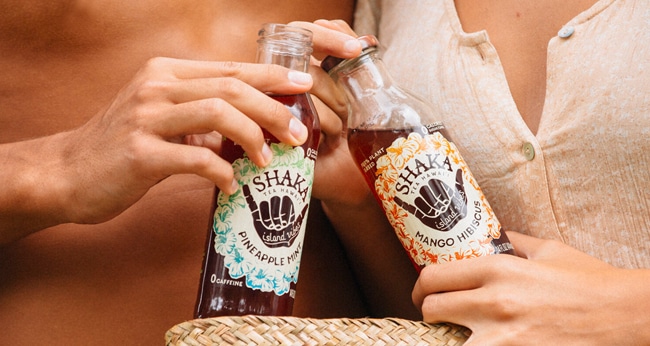Shaka Tea, a Hawaii-based maker of ready-to-drink and bagged tea products, has raised $2.3 million in a funding round led by farming company Mahi Pono, bringing the brand’s total financing to $4.1 million.
Based in Maui, Mahi Pono is focused on sustainable agriculture and partnered with Shaka Tea due to the brand’s mission to support Hawaiian farmers, said SVP Shan Tsutsui in a press release. The round also includes investments from King’s Hawaiian, Gingerbread Capital, LDR Ventures, Allison Rose Culinary Ventures and Park Bench Capital as well as several angel investors. Mahi Pono will gain a seat on the brand’s board of directors and King’s Hawaiian will act as a board observer.
Founded in 2016, Shaka Tea produces ready-to-drink and bagged teas made from locally sourced Hawaiian mamaki tea leaves. The brand’s bottled line features zero calorie varieties including Lemon Lokelani Rose, Pineapple Mint and Guava Gingerblossom, and Mango Hibiscus. Each flavor is sweetened with monkfruit and retails for $1.99-$2.49 per 14 oz. bottle.
Shaka Tea president Bella Hughes, who co-founded the brand with her husband and CEO Harrison Rice, said the funding will be used to support the company’s nationwide and international expansion. Shaka Tea is currently available in about 2,000 stores with an additional 1,000 accounts approved for rollout this year. The brand is sold at Whole Foods South Pacific region, The Fresh Market, GNC, Bristol Farms, Gelson’s, Lowes Foods and select Walmart locations, among other retailers.
While it is primarily focused on building its presence in the continental U.S., the brand also recently added Natural Lawson convenience store accounts in Japan, Hughes said.
“With a population of only 1.3 million, [Hawaii] is a very small market to play in,” Hughes said. “Our mission has always been to have the most economic impact with our local community and how we connect local sustainably sourced mamaki to now national and, with Japan, international demand. So extending to the continental U.S. was always our vision.”
According to Hughes, Shaka Tea aims to provide a premium-grade product at an affordable price point, a quality that will give the brand an edge in the crowded RTD tea category. Though the company uses premium ingredients sourced on the Hawaiian islands, the company has reduced costs by co-packing in the continental U.S.
Hughes noted that maintaining a lower price point is important to her and Rice, who were “nearly broke” when they founded the company four years ago and were dismayed by what they saw as a trend of increasingly expensive beverages. By keeping the price affordable, she said, Shaka Tea aims to scale rapidly and drive volume by being accessible to consumers of all income levels. As the U.S. economy enters a recession, Hughes credited the price point, along with a recent package redesign, with driving 300% year-over-year growth in Q1, despite the pandemic.
“Since 2016, there definitely has been a movement for $4-$10 beverages, with people not thinking twice about those higher price points,” she said. “No one was thinking about a pandemic or this economic downturn.”
To date, Hughes said that Shaka Tea has operated as a “capital efficient” company with only six full time employees, but has recently made new hires to help relaunch its ecommerce platform. The company saw a 566% increase in online sales since the onset of the COVID-19 pandemic in March and will launch an updated website on June 15.
The funding will also be put toward innovation. Though she did not specify what kind of product the company is developing, Hughes said Shaka Tea will launch a zero calorie product in “a new form factor” this summer.
In addition to scaling its ready-to-drink business, Shaka Tea is also expanding its bagged tea products in retail and online. The company produces several mamaki tea blends including Sunrise (hibiscus, lemon and rosehip), Sunset (passionflower and rose) and Blue Magic (butterfly pea and lemongrass). The line retails for $13.99 per 15 bag multipack. Hughes noted the dry tea line gives the brand appeal to a broader demographic, as the RTD line attracts younger consumers while the dry tea is more popular with women aged 34-55. The line launched last year in Cost Plus World Market accounts and entered Whole Foods this year.
